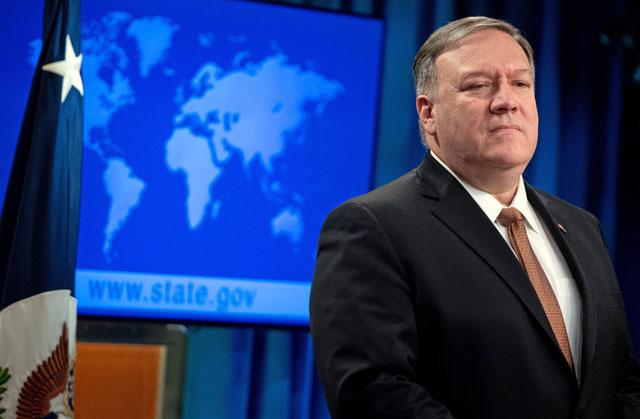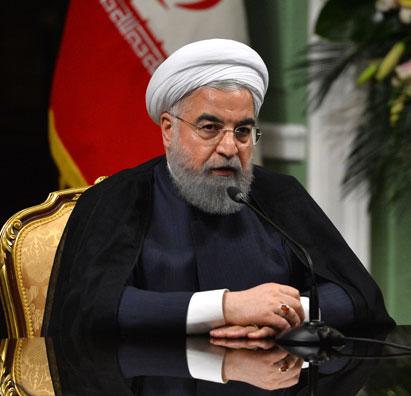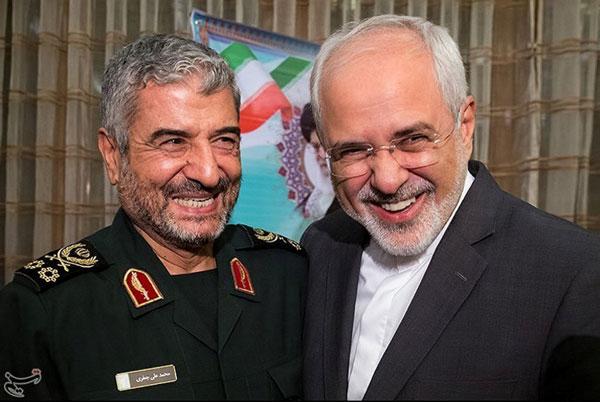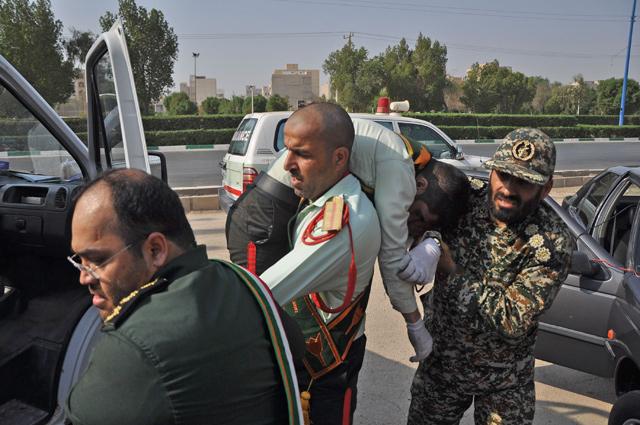You are here
In unprecedented move, US names Iran's revolutionary guard terrorist group
By Reuters - Apr 09,2019 - Last updated at Apr 09,2019

US Secretary of State Mike Pompeo announces that the US will designate Iran's Islamic Revolutionary Guard Corps as a foreign terrorist organisation during a press conference at the State Department in Washington, DC, on Monday (AFP photo)
WASHINGTON/DUBAI — US President Donald Trump on Monday branded Iran's elite Islamic Revolutionary Guard Corps (IRGC) a terrorist organisation, an unprecedented step that raises the spectre of retaliation from Tehran in an increasingly tense Middle East.
It is the first time the United States has formally labelled another country's military a terrorist group.
"The IRGC is the Iranian government's primary means of directing and implementing its global terrorist campaign," Trump said in a statement.
Iran immediately condemned the decision as an illegal act prompted by Tehran's regional influence and "success in fighting against Islamic State," according to state television.
Tensions between the two countries have grown since Trump pulled the United States out of a 2015 nuclear deal with Tehran last May and reimposed sanctions that had crippled Iran’s economy. Trump said the accord did not address Iran’s ballistic missile activity or what he saw as its malign influence in the region.
Set up after the 1979 Islamic Revolution with the mission of protecting the Shiite clerical ruling system, the IRGC is Iran’s most powerful security organisation and has a huge influence in its political system, controlling large swathes of the economy and the armed forces.
The IRGC’s involvement in Iran’s banking and shipping industries could complicate matters with US allies, including the European Union, which is setting up a new mechanism to facilitate payments for Iranian exports. It was not immediately clear how Monday’s move would impact Europe’s trade ties with Iran.
Those who do business with the guards could now receive up to 20 years in prison and be barred from entering or doing business in the United States.
The action on Monday “makes crystal clear the risks of conducting business with, or providing support to, the IRGC”, Trump said. “If you are doing business with the IRGC, you will be bankrolling terrorism.”
After reports of the planned US designation emerged on Friday, Iranian lawmakers warned Tehran will take reciprocal action.
Critics have warned the US action could open US military and intelligence officials to similar moves by unfriendly governments.
The United States has already blacklisted dozens of entities and people for affiliations with the IRGC, but not the organisation as a whole.
‘Outlaw regime’
Secretary of State Mike Pompeo, a strident critic of Iran, has pushed for the change in US policy as part of the Trump administration’s tough posture toward Tehran.
The US action against the entire IRGC had been debated in the Trump administration for months as Washington sought additional ways to pressure Iran and curtail its growing influence in Syria, Iraq and Yemen.
“This designation is a direct response to an outlaw regime and should surprise no one,” Pompeo said. The designation comes into effect next Monday.
In 2017, IRGC commander Mohammad Ali Jafari warned that if Trump went ahead with labelling the group as terrorist “then the revolutionary guards will consider the American army to be like Islamic State [Daesh] all around the world”.
Such threats are particularly ominous for US forces in places such as Iraq, where Iran-aligned Shiite militia are located in close proximity to US troops.
The State Department said on Monday that the guards have been engaged in terrorist activity since the group’s inception, including the 1996 Khobar Towers bombing in Saudi Arabia that killed 19 Americans, and a foiled plan to attack the Saudi ambassador to the United States on US soil. It cited what it said were IRGC terrorist plans that had been uncovered in Europe and Africa.
Some critics of the Trump administration’s move believe it was timed ahead of the Israeli election on Tuesday.
Israeli Prime Minister Benjamin Netanyahu thanked Trump for taking the action in a Twitter post. Iran and Israel are increasingly at odds with each other, particularly in Syria where the revolutionary guards’ Quds Force has helped President Bashar Assad gain the upper hand in a civil war.
After reports of the designation emerged late on Friday, Iranian lawmakers warned Tehran will take reciprocal action.
IRGC’s wide net
The IRGC is in charge of Iran’s ballistic missiles and nuclear programmes. Tehran has warned that it has missiles with a range of up to 2,000km, putting Israel and US military bases in the region within reach.
The IRGC’s economic footprint grew under Iranian former president and ex-guard Mahmoud Ahmadinejad from 2005. Soon after the United States, EU and the United Nations imposed sanctions on Iran’s oil and finance sectors in 2012, the IRGC took up the businesses of the European oil firms that were been forced to leave.
Iran’s clerical rulers rewarded the group for sanctions-busting as well as suppressing dissent at home and helping Tehran’s allies abroad — notably Syria’s Assad.
However, in recent years much of the IRGC’s business has been conducted through front companies, many of them not even formally owned by the corps, but by people and firms linked to it.
Previous administrations have considered expanding the designation to the entire group, but decided that the risk to US forces overseas was too great, according to former US officials.
The Pentagon declined to discuss what the US military was doing to protect its troops from any retaliation by the IRGC or Iran-aligned militia in places like Iraq. US officials, speaking on condition of anonymity, assured that the US military was taking all necessary steps and had alerted US military commanders prior to the announcement.
The announcement comes ahead of a May 2 deadline by the United States on whether or not to extend oil waivers to eight importers of Iranian oil.
Reducing the number of waivers will limit oil exports from Iran, the fourth-largest producer in OPEC, but the United States is unlikely to meet an earlier target of driving Iranian oil exports to zero.
Related Articles
LONDON — Iran promised on Monday to give a “crushing” response if the United States designated its elite Revolutionary Guards as a terrorist
LONDON — A tough line from President Donald Trump has been met by a show of unity from both sides of Iran’s political divide, uniting hardli
DUBAI — Gunmen fired on a military parade in south-western Iran on Saturday, killing 25 people, almost half of them members of the Revolutio


















